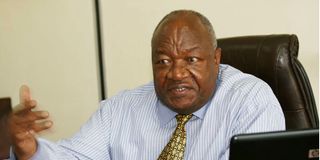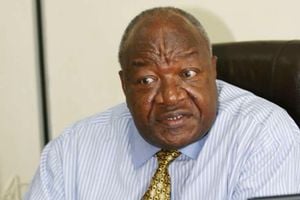
Henry Chakava during a past interview.
The final chapter in the life of celebrated publisher Henry Chakava ended at Nairobi Hospital on Friday.
He was admitted last week after being brought in from his retirement home in Vipingo Ridge.
Chakava has been mourned by publishers, writers and the academic world for his contribution to knowledge, publishing, literature and education locally and abroad.
He is credited with pioneering publishing African writers when the industry was dominated by foreign firms and editors.
He published Kenya’s pre-eminent writer Ngugi wa Thiong’o, who was his lecturer at the University of Nairobi.
The man who ventured into publishing by accident ended up dominating the field and midwifing works by Chinua Achebe, Alex la Guma, Taban lo Liyong, David Maillu, John Kiriamiti, Meja Mwangi, Grace Ogot, Okot p’Bitek, Yusuf Dawood and many other authors.
“He’s been my friend. I don’t know anybody as daring as Chakava. He was bold and published books that no one else dared to,” Mr Maillu said.
“He encouraged authors to write and invited me to publish with his firm. I’m one of the pioneers of self-publishing.”
Mr Maillu was equally daring, writing content many considered outlandish and which mainstream publishers shunned.
He credits Chakava for mainstreaming a section of literature generally derided as “pop fiction”.
“By pioneering a series purely dedicated for popular fiction, Chakava succeeded in building a base for what would later become an avenue for young authors to tell stories that could otherwise not be read,” Mr Maillu said.
Prof Mukoma wa Ngugi also mourned the publisher.
“Chakava and my father (Prof Ngugi wa Thiong’o) were radical political and literary ‘trouble’ makers. African writing would be very different without Henry Chakava’s contribution. It would be a four-legged stool but missing its East African leg,” he said.
“What I remember the most was his laugh, deep, genuine and loud – the kind of laughter that comes from one who has suffered for their beliefs and done their duty to those same beliefs. One of my best memories is visiting him at his home with my father, listening to their stories and being able to see them as young men embarking on a journey that would change their lives and that of Kenya.”
Prof Mukoma wa Ngugi teaches at Cornell University, the US.
Writing in Coming of Age, a compilation of essays on Chakava when he turned 70, Kamau Kiarie, the CEO of the company founded by the veteran – East African Educational Publishers – describes stumbling into the world of letters.
Chakava graduated from the UoN in 1972 with a double First Class Honours degree in literature and philosophy. He was offered a local scholarship he did not take up because of some delays.
A chance to study abroad appeared more realistic when he received another scholarship. Unfortunately, it failed due to lack of an appropriate supervisor for his thesis.
It is at that point that one of his lecturers, Prof Andrew Gurr, secured him a temporary job at the Nairobi office of Heinemann Educational Books (HEB).
After just four years, Chakava had risen to become the managing director of the company. Heinemann Group chairman, Allan Hill, described the interview.
“There was a complete failure of communication with the candidate. Henry didn’t seem to care whether he got the job or not. Prof Gurr was disappointed, and suggested a second interview, but this time out of office – a suggestion supported by Henry’s friends Ngugi and Taban. ‘Did you give him a beer? asked Taban. ‘No’, replied David. ‘Well then, what do you expect! See him again and give him a beer.’ The advice was followed. And Henry put up a stunning performance, and walked away with the job.”
It is that platform that he would use for decades to churn out books read across the world.
He and other local entrepreneurs acquired HEB in 1992.
In the later stages of his life, chakava gave up the daily running of the company and went into retirement. He sold his Nairobi home and moved to the scenic Vipingo Ridge in the Coast to write the final chapter of his life.
Chinua Achebe described him in glowing terms when he wrote the foreword to Publishing in Africa: One Man’s Perspective by Chakava.
“One of Allan Hill’s star pupils was Henry Chakava whom he snatched from a very promising academic career in literature and philosophy and who is today one of the most pivotal indigenous publishers in Africa,” he wrote.
When Chakava joined HEB, Hill had already started the Africa Writers Series but it was upon Chakava to expand and maintain the quality of literature. He did it successfully.
“If he had chosen academic life, he would, in all likelihood, have turned out to be a leading professor in any academy. In choosing publishing, he became a producer of knowledge in the broadest sense of the term by enabling and giving African intellectual production continental and global visibility,” wrote Prof Ngugi wa Thiong’o.
Chakava’s association with Prof Ngugi wa Thiong’o did not come without a price as the don had – through his pen – become a thorn in the flesh of presidents Jomo Kenyatta and Daniel arap Moi.
Writing in Coming of Age, Prof Ngugi describes the violent attack on Chakava for publishing his novel in Gikuyu: Caitaani Mutharabaini (Devil on the Cross).
Ngugi wrote the tome while at Kamiti Maximum Security Prison where he had been detained by Mzee Kenyatta.
He was freed on December 12, 1978 when the Moi presidency was just months old and presented the manuscript – which he says was written on toilet paper – to Chakava.
“A week before the publication, assassins waited for him at the gate of his house in Lavington. They tried to drag him into the boot of their car. An approaching motorist foiled the plot. One of the attackers thought of finishing the job on the spot, or make an irrevocable damage and aimed a machete at Chakava’s head, just about managed to move it, simultaneously raising his hand as a shield. The assassin cut off Chakava’s finger. Then they fled the scene. The finger had to be re-attached,” Ngugi writes.
Social justice
Chakava soldiered on and Caitaani Mutharabaini was off the press in 1981, alongside the play Ngaahika Ndeenda, which was later translated to I will Marry When I Want.
More violence would be meted on Chakava when he published Prof Ngugi’s next book in Gikuyu, Matigari, a novel on social justice.
“In 1986, a few weeks after the publication, police raid Chakava’s warehouse and ‘arrest’ Matigari, the book; and in 2004, and a week before the launch of Murogi wa Kagogo (Wizard of the Crow), my wife and I, barely escape with our lives,” says Prof Ngugi.
He was referring to the attack on his return to Kenya from exile in the US for the launch of the book, again published by Chakava.
Prime Cabinet Secretary Musalia Mudavadi mourned Chakava as a friend, adviser, compatriot and eminent Kenyan.
He described him as a “stalwart who was the founding chairman of Vihiga Cultural Society, the progenitor of the popular Maragoli Cultural Festival.
“Chakava grew this nascent renaissance to be the first Unesco-recognised cultural festival in Kenya,” Mr Mudavadi said.
Among the many accolades Mr Chakava won was an honorary doctorate from Oxford Brookes University.
Mr Chakava is survived by his wife Rosalind and children, Sharon Chakava-Banda, Andia Chakava and Dr Yolanda Chakava-O’regan.
“My dad was a man of many firsts. He put many budding writers on the global stage. He was extremely supportive and provided the very best for us. We will miss him dearly,” Ms Sharon said.









